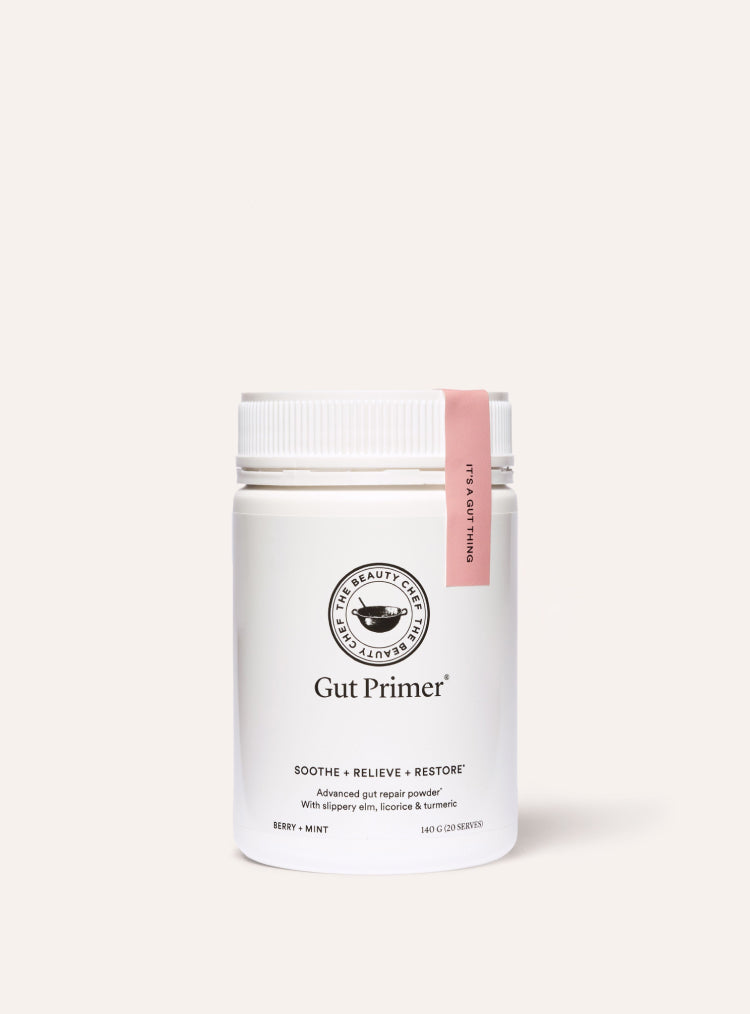
By Carla Oates
If you’ve ever overindulged in a big meal or munched on something that doesn’t necessarily agree with you—only for your belly to be left feeling distended, stretched beyond capacity, tight or irritable—then you can relate to what is commonly referred to as bloating.
Trouble is, while for many of us this feeling is fleeting, for some, bloating can be ongoing and debilitating when the trigger or underlying cause remains unidentified. Given that research shows 1 in 6 of us without a health condition and 3 and 4 people with irritable bowel syndrome (IBS) in Australia regularly suffer from bloating—it’s a digestive issue that is more common than we likely realise.
If you’re stuffed with feeling, well, stuffed—here are a few tried and tested methods to help identify the cause of your bloating as well as how to find relief.
What causes bloating?
One of the most common myths regarding bloating is that it is the same affliction as water retention. This, however, is untrue as bloating is actually caused by a buildup of intestinal gas, not fluid—which contributes to that painful, distended feeling you get in your belly.
Those with sensitive stomachs are also more likely to experience bloating as it can be linked to gastrointestinal sensitivity issues.
How can you get rid of bloating?
The million-dollar question, therefore, is how to get rid of bloating, reduce its painful side effects and find relief that lasts? The good news is, there are a number of proven ways to help remedy bloating, it’s simply a matter of paying close attention to your diet, identifying and avoiding triggers and remaining consistent in how you choose to manage it.
Here’s our step-by-step guide...
Step 1: Identify and avoid foods you are allergic or intolerant to
The first step in identifying and remedying any digestive issue is to assess your current diet and pinpoint if there are any particular foods that you are either allergic, intolerant to or irritated by. This is imperative as when we consume foods that cause us digestive upset, one of the unwelcome side effects can be excess gas and uncomfortable bloating.
Some of the most common triggers include food intolerances to gluten, dairy products and FODMAP-containing foods as for some people, these foods can be difficult to digest or contribute to malabsorption issues, triggering a myriad of gastrointestinal symptoms—including bloating. FODMAPs, for example, are short-chain carbohydrate molecules that are found in a variety of foods including wheat, onions, garlic, some legumes, lactose (found in dairy), fructose in fruits and sugar alcohols like sorbitol and mannitol. For those with FODMAP sensitivity, it’s once these compounds reach the large intestine that they can contribute to digestive upset and symptoms such as bloating, abdominal pain, cramping and even diarrhoea.
If you suspect you are intolerant to FODMAPs, it’s best to work with a trusted healthcare practitioner before embarking on a low-FODMAP diet as it can be very restrictive and all-consuming as you are required to avoid and eliminate a large variety of foods.
Step 2: Avoid constipation
A diet that lacks fibre or adequate hydration, combined with a lack of exercise and/or stress can slow digestive function, resulting in constipation and bloating. While fibre is, of course, incredibly important for the health and diversity of our gut microbes, if you’re prone to bloating, it’s important to increase fibre slowly—as too much too soon can actually cause excess gas. At the same time, focus on staying well hydrated in order to maintain regular bowel movements and keep your digestive system flushing through. If possible, try to move your body daily, too, as physical activity can not only help to prevent constipation but also alleviates stress—which we know is also a contributing cause of digestive dysfunction.
Step 3: Try to avoid swallowing ‘gas’
Carbonated or fizzy drinks contain gas that can build up in the digestive tract and subsequently contribute to a distended bloated belly—but the artificial sweeteners used in these products can also cause excess gas.
Swallowing air is another bloating trigger—so when eating, focus on taking smaller, more mindful mouthfuls. Chew your food properly to aid the digestive process and avoid drinking with meals or chewing gum afterwards.
Step 4: Ditch gas-causing foods
Just as it’s important to avoid swallowing gas, it’s also essential to reduce your intake of foods that cause gas, too. While everyone’s tolerance for these foods varies, common culprits include beans, legumes and cruciferous veggies like broccoli, cabbages, Brussels sprouts and cauliflower. Although you likely need not avoid these delicious fibre-rich foods entirely, if they are problematic for you, introduce them slowly by starting with smaller portions or opting for fermented varieties which have already been ‘predigested’ by good bacteria and can therefore assist in the digestive process.
Step 5: Consider probiotics and digestive herbs
Another cause of bloating can be gas produced by the bacteria in our gut. The species of bacteria that comprise our microbiome varies from person to person, with different strains responsible for different things.
While over the counter probiotic supplements typically only carry a few species or strains, fermented foods are naturally rich in a diversity of probiotic bacteria and are therefore a simple way to boost your gut health and beat the bloat. Kimchi, sauerkraut, kefir and The Beauty Chef inner beauty products are all simple ways to include more probiotics in your diet daily.
Digestive herbs can also help to target and relieve abdominal bloating, as well as reduce flatulence and indigestion. SUPERGENES™ Debloat & Digest Well contains herbs traditionally used in Western Herbal Medicine, such as fennel to relieve abdominal bloating and barberry to support healthy digestive system function. With the convenience of a capsule format, simply take two daily to reduce symptoms.






